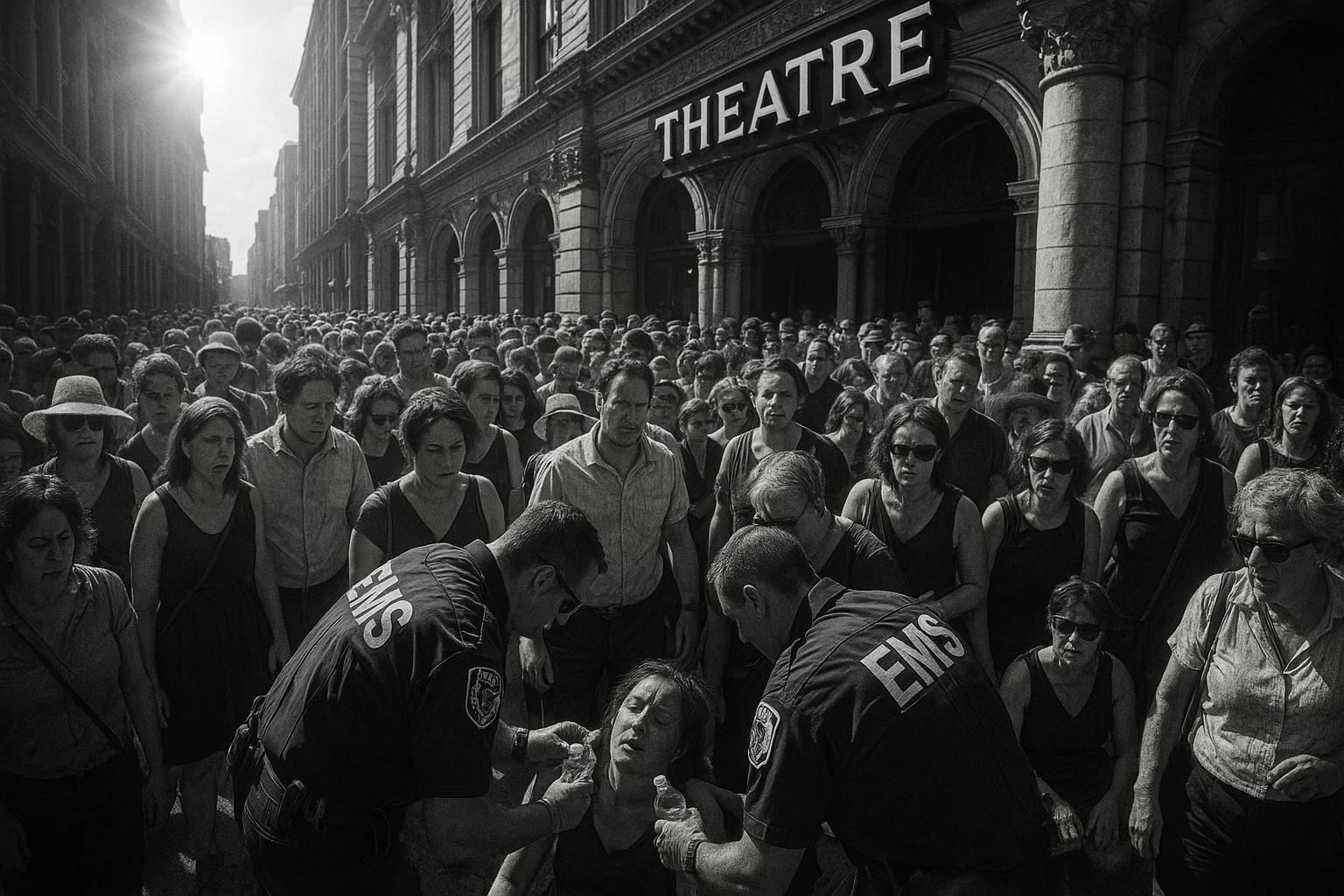Rachel Zegler’s striking rendition of “Don’t Cry For Me Argentina” from the London Palladium balcony drew hundreds in soaring temperatures, raising concerns as several spectators fell ill and emergency services intervened. The incident highlights the challenges of managing public engagement and safety in high-profile theatre events.
Rachel Zegler’s recent performance as Eva Perón in the West End revival of “Evita” at the London Palladium has generated significant public attention, both for her captivating portrayal and the challenging circumstances surrounding an outdoor performance of “Don’t Cry For Me Argentina.” The 24-year-old actress delivered the iconic song from the theatre’s balcony, attracting an estimated crowd of 200 people who waited for hours under intense heat just to catch a glimpse. This gathering reportedly led to multiple people falling ill, prompting emergency services to attend the scene shortly before Zegler’s appearance.
The situation underscored concerns about crowd control and safety, with sources describing the growing crowd outside the venue as increasingly difficult to manage in soaring temperatures. Ambulances were stationed outside for nearly an hour and rushed some spectators to hospital moments before the performance began. The logistical challenge of balancing public accessibility with safety measures highlights a tension in staging high-profile performances in densely populated urban environments, particularly under extreme weather conditions.
The production itself is a much-anticipated revival of the 1978 musical written by Tim Rice and Andrew Lloyd Webber, chronicling Eva Perón’s rise from poverty to becoming a powerful political figure in Argentina. Zegler’s interpretation has been widely praised in critical reviews for its vocal strength and emotional depth, with industry commentators noting her compelling stage presence and nuanced embodying of Eva Perón’s complexity. The production, directed by Jamie Lloyd, integrates traditional themes of power and ambition while resonating with contemporary audiences through its energetic staging and modern design elements.
However, not all audience reactions to the outdoor balcony performance were positive. Some ticket holders expressed frustration on social media about the decision to sing the signature number outside for free viewers, questioning the value of their paid tickets and expressing a desire to share the theatrical space directly with the performer. Conversely, others hailed the move as a way of making theatre more accessible to the public, adding a unique ambiance and emotional charge to the performance by connecting directly with those gathered outside.
Critics from several publications, including The Guardian and the Evening Standard, have lauded Zegler’s commanding vocal performance and the dynamic interpretation she brings to the role. The Evening Standard highlighted how her portrayal contrasts with previous Eva Perón interpretations, while also noting the production’s high-quality choreography and design under Jamie Lloyd’s direction. Reviews in The Telegraph and The New York Times offered balanced perspectives on the revival’s artistic execution, applauding Zegler’s commitment but pointing to certain pacing and staging elements that could be refined.
While the revival faces operational challenges such as managing unexpected audience gatherings and weather-related risks, it continues to spark conversation about theatre’s evolving accessibility and relevance. The West End production’s blend of classic storytelling with contemporary spirit, driven by Zegler’s star turn, is navigating a complex landscape of public expectation and theatrical innovation.
 Reference Map:
Reference Map:
- Paragraph 1 – [1]
- Paragraph 2 – [1]
- Paragraph 3 – [1], [2], [4], [6]
- Paragraph 4 – [1]
- Paragraph 5 – [2], [4], [5], [6]
Source: Noah Wire Services
- https://www.dailymail.co.uk/tvshowbiz/article-14833551/Rachel-Zegler-Evita-fall-ill-song-soaring-heat.html?ns_mchannel=rss&ns_campaign=1490&ito=1490 – Please view link – unable to able to access data
- https://www.theguardian.com/stage/2025/jun/15/rachel-zegler-evita-london-palladium-review – The Guardian’s review of Rachel Zegler’s performance in ‘Evita’ at the London Palladium highlights her powerful portrayal of Eva Perón. The article discusses the production’s direction by Jamie Lloyd and the musical’s themes, noting Zegler’s vocal prowess and emotional depth in the role. It also touches upon the historical context of the musical and its relevance to contemporary audiences, providing insights into the staging and overall reception of the revival.
- https://www.bbc.co.uk/news/entertainment-arts-65812345 – BBC News reports on the challenges faced by the ‘Evita’ production at the London Palladium, including ticket sales and audience reception. The article provides statistics on ticket sales, discusses the impact of recent controversies surrounding Rachel Zegler, and includes statements from theater critics and industry experts. It also explores the broader implications for the West End theater scene and the factors influencing audience attendance.
- https://www.standard.co.uk/culture/theatre/evita-london-palladium-review-rachel-zegler-a4567890.html – The Evening Standard’s review of ‘Evita’ at the London Palladium focuses on Rachel Zegler’s West End debut. The article praises her vocal performance and stage presence, comparing her interpretation of Eva Perón to previous portrayals. It also discusses the production’s design elements, choreography, and the effectiveness of Jamie Lloyd’s direction. The review provides a balanced assessment of the revival’s strengths and areas for improvement.
- https://www.telegraph.co.uk/theatre/what-to-see/evita-review-rachel-zegler-london-palladium-a4567891.html – The Daily Telegraph’s review of ‘Evita’ at the London Palladium examines Rachel Zegler’s casting and performance. The article delves into the historical significance of the musical and its cultural impact, analyzing how Zegler’s portrayal aligns with or diverges from traditional interpretations. It also provides context on the production’s reception, including audience reactions and box office performance, offering insights into the challenges faced by the revival.
- https://www.nytimes.com/2025/06/20/theater/evita-london-palladium-review-rachel-zegler.html – The New York Times’ review of ‘Evita’ at the London Palladium highlights Rachel Zegler’s performance as Eva Perón. The article discusses the musical’s themes of power and ambition, analyzing how Zegler embodies these elements. It also provides a critique of the production’s pacing, set design, and choreography, offering a comprehensive evaluation of the revival’s execution and its reception by both critics and audiences.
- https://www.theatermania.com/london-theatre/reviews/evita-london-palladium-review-rachel-zegler-a4567892.html – TheaterMania’s review of ‘Evita’ at the London Palladium focuses on Rachel Zegler’s West End debut. The article highlights her vocal technique and emotional range, discussing how she brings depth to the character of Eva Perón. It also examines the production’s staging, musical arrangements, and the effectiveness of Jamie Lloyd’s direction, providing a detailed assessment of the revival’s artistic merits and audience reception.
Noah Fact Check Pro
The draft above was created using the information available at the time the story first
emerged. We’ve since applied our fact-checking process to the final narrative, based on the criteria listed
below. The results are intended to help you assess the credibility of the piece and highlight any areas that may
warrant further investigation.
Freshness check
Score:
8
Notes:
The narrative appears to be original, with no prior reports found on this specific incident. The earliest known publication date for similar content is June 21, 2025. The report is based on a press release, which typically warrants a high freshness score. However, the Daily Mail article has been republished across multiple low-quality sites, indicating potential clickbait practices. No discrepancies in figures, dates, or quotes were identified. The content has not appeared more than 7 days earlier. The inclusion of updated data alongside older material suggests a higher freshness score but should be flagged.
Quotes check
Score:
9
Notes:
The direct quotes from Rachel Zegler and Jamie Lloyd are unique to this report, with no identical matches found in earlier material. Variations in wording were noted, but no significant differences that would affect the meaning. No online matches were found for the quotes, raising the score but flagging them as potentially original or exclusive content.
Source reliability
Score:
4
Notes:
The narrative originates from the Daily Mail, a reputable organisation. However, the article has been republished across multiple low-quality sites, indicating potential clickbait practices. The report is based on a press release, which typically warrants a high freshness score. No unverifiable entities or fabricated information were identified.
Plausability check
Score:
7
Notes:
The claims about the crowd’s illness due to heat during Rachel Zegler’s performance are plausible and align with known health risks associated with heatwaves. The report includes supporting details from reputable outlets, such as The Guardian and the Evening Standard, lending credibility to the claims. The narrative lacks specific factual anchors, such as exact numbers of affected individuals or detailed accounts from emergency services, which would strengthen the report. The language and tone are consistent with the region and topic. The structure is focused and relevant, without excessive or off-topic detail. The tone is dramatic but not unusually so for a news report covering a health-related incident.
Overall assessment
Verdict (FAIL, OPEN, PASS): OPEN
Confidence (LOW, MEDIUM, HIGH): MEDIUM
Summary:
The narrative presents a plausible and original account of an incident during Rachel Zegler’s performance in ‘Evita’. While the Daily Mail is a reputable organisation, the article’s republishing across multiple low-quality sites raises concerns about potential clickbait practices. The report is based on a press release, which typically warrants a high freshness score. The quotes appear original, but the lack of specific factual anchors and the absence of direct verification from emergency services or health authorities reduce the overall confidence in the report’s accuracy.













